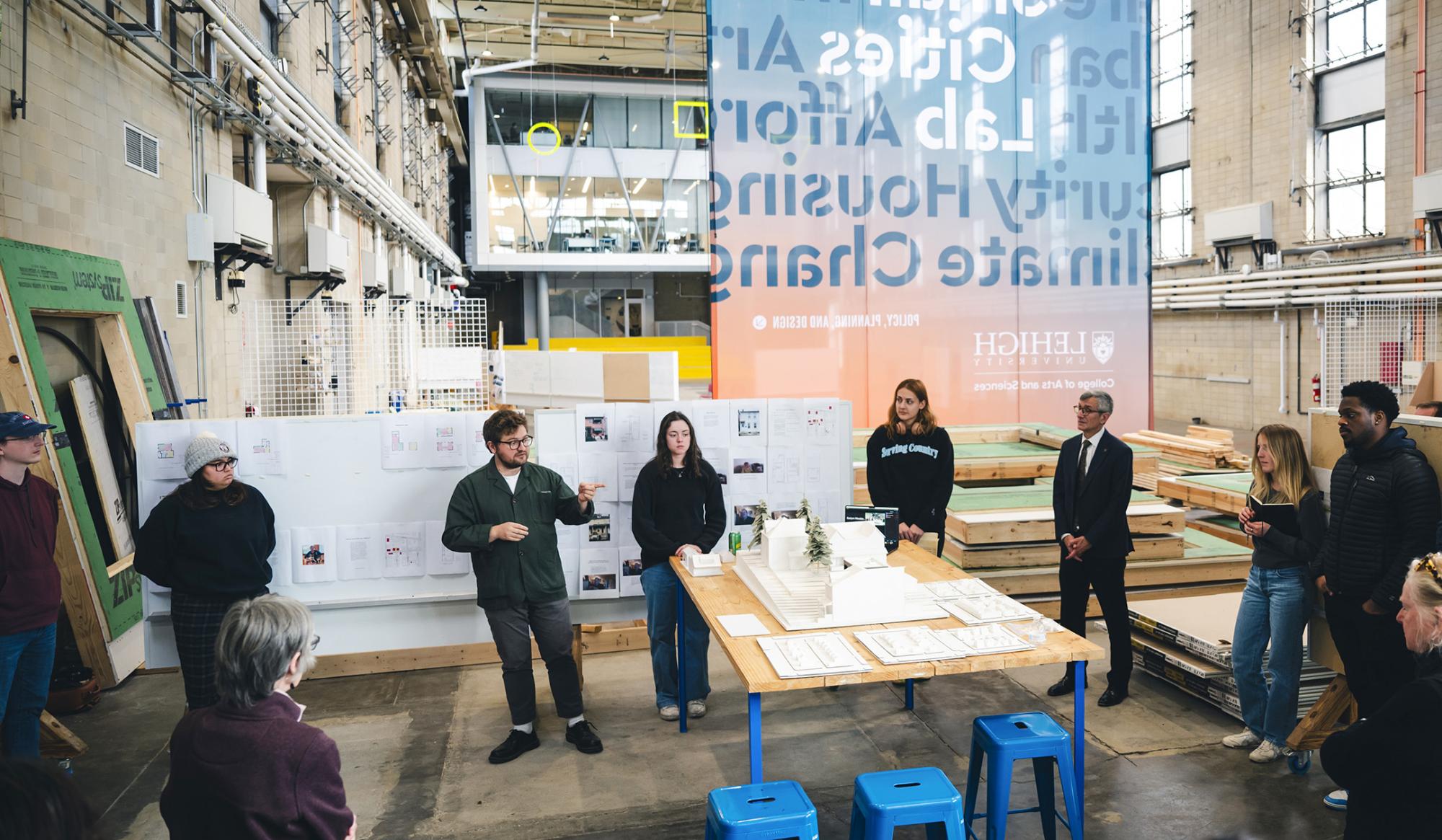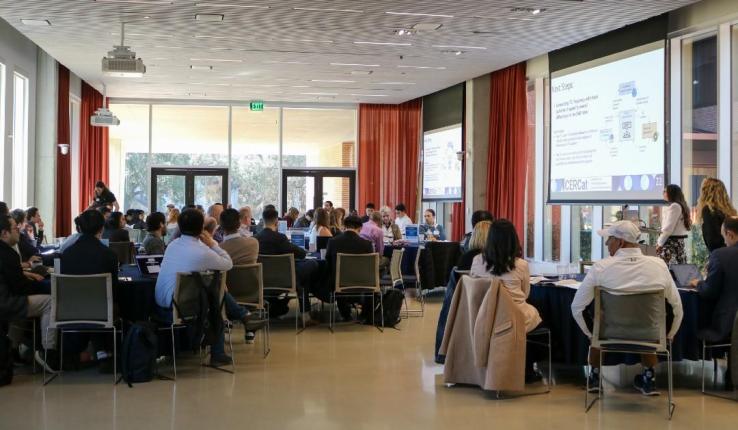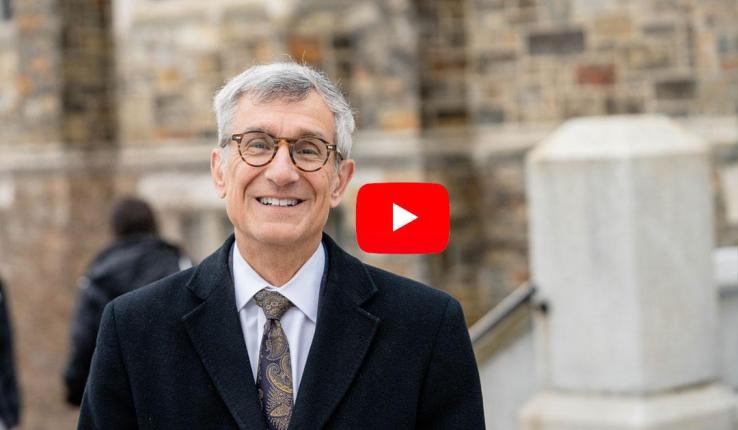Lehigh University’s Small Cities Lab (SCL) has made significant strides in addressing the challenges facing America’s small cities—communities often under-researched and under-resourced. Founded with a commitment to working with municipalities, non-profit organizations, allied industries and local residents to tackle complex issues like affordable housing, worsening climate conditions, and infrastructure decay, the lab has evolved into a beacon of innovative, community-driven solutions. Recently designated as a research center within the College of Arts and Sciences, the SCL brings together the collective expertise of Lehigh’s faculty, students, and resources to develop practical strategies for strengthening small cities in collaboration with community partners.
A Focus on Affordable Housing
“The genesis of the Small Cities Lab was driven by one of the most pressing challenges facing small cities—affordable housing,” said Wes Hiatt, assistant professor of Art, Architecture and Design. Bethlehem, Pennsylvania, a prime example of a small city undergoing economic transformation, became the launchpad for one of SCL’s first major initiatives: the Alley House Program. This program seeks to revive the historic "Alley House" model, which was originally built in the 19th century to provide affordable housing for migrant workers during Bethlehem’s industrial boom. However, modern zoning laws have restricted the use of these structures in many areas, creating a gap in affordable housing, according to Hiatt.
With startup funding and staff support from the College of Arts and Sciences, the SCL identified a critical need for creative, place-based research to understand how such models could be reintroduced in the context of contemporary urban challenges. “The Alley House Program has grown beyond zoning reform to spark broader conversations about housing equity in small cities,” said Robert Flowers, Herbert J. & Ann L. Siegel Dean of the College. “Investing early in Professor Hiatt’s vision was an easy decision. This program is poised to shape national conversations on affordable housing through creative design, thoughtful policy, and community-driven research.”
Building Coalitions for Lasting Change
One of the hallmarks of the Small Cities Lab’s approach is its ability to build strong coalitions between university partners, community leaders, and government agencies. The SCL brings together a diverse set of stakeholders—from local nonprofits like Community Action Lehigh Valley to the City of Bethlehem and the Pennsylvania Department of Community and Economic Development—to ensure that solutions are grounded in local knowledge and community needs.
“The Small Cities Lab helps The City of Bethlehem craft public policy grounded in national best practices,” said Sara Satullo, deputy director of community development. “It boosts our staff capacity, enriches our housing work and gives students real-world experience. Mid-sized cities like ours rarely have the resources for the in-depth research the Lab provides.”
Through these collaborations, the Alley House Program has been able to design and build pilot units that test the viability of reintroducing affordable housing models, including up to four demonstration units soon to be under construction in West Bethlehem. The program has already attracted over $1.5 million in funding, including grants from HUD and the Pennsylvania Housing Finance Agency, showcasing the program’s potential to scale. The Lab was also awarded a Community Projects Funding grant – the first award of its kind in Lehigh history – through a Congressional appropriation supported by former Sen. Bob Casey and former Rep. Susan Wild.
In January, the Lab’s Co-Directors were invited by the Pennsylvania Department of Community and Economic Development to participate in roundtable discussions to inform Governor Shapiro's Housing Action Plan. The Co-Directors shared research insights and advocated for housing policy change informed by on-the-ground experience in small cities like Bethlehem.
The Alley House Program Steering Committee convenes quarterly in the Small Cities Lab space on Lehigh’s Mountaintop area to review the progress and discuss priorities as the City of Bethlehem considers updates to its zoning ordinance. Topics such as parking requirements, owner-occupancy rules and building design considerations were at the forefront of these discussions, illustrating how research conducted by the SCL is directly informing local policy decisions.
Expanding Focus: New Challenges, New Solutions
As the SCL gains momentum, its focus is expanding beyond housing to address broader issues impacting the Lehigh Valley, Pennsylvania, and other small cities across the nation. The lab’s diverse portfolio now includes a wide range of interdisciplinary projects designed to create long-term, scalable solutions for urban problems.
Key Projects at the SCL
- Disability Health, Social Life, and Wellbeing: Exploring how urban spaces support or hinder individuals with intellectual, developmental, cognitive, or psychiatric disabilities.
- Empowering Communities for Climate Justice: Providing job training and advocating for clean-energy solutions in marginalized communities.
- LANTA Partnership: Improving the functionality and accessibility of a bus station in South Bethlehem.
- Tree Equity Coalition: Enhancing urban forestry in Allentown’s most disadvantaged neighborhoods.
- Equitable Access to Electricity: Evaluating the impacts of retail electric deregulation on low-income communities.
- Urban Heat: Addressing the health impacts of extreme heat in Allentown and other small cities.[AB3]
These projects focus on infrastructure, health and social equity and illustrate the SCL's broad impact and commitment to fostering inclusive communities.
This fall, SCL is planning to convene community leaders, academics, non-profits, municipal officials and government agencies for the Small Cities Co-Lab, an inaugural symposium and workshop. This event will enable the SCL to build new partnerships, networks and further expand its research agenda.
From Student to Advocate: Ernesto Zelaya’s Journey
One of the most compelling stories emerging from the Small Cities Lab is that of Ernesto Zelaya '24, a Lehigh University graduate whose journey from architecture student to advocate for housing justice exemplifies the real-world impact of the lab's work. “I initially joined the Alley House Program as part of my architectural studies,” said Zelaya. “But this is where my passion for housing justice grew. Working on policy analysis related to zoning laws, I realized how critical zoning reform was to increasing affordable housing availability and accessibility.”
His experience with the Alley House project deeply influenced his decision to shift his focus to urban planning and community development. Today, Ernesto works with Strategic Actions for a Just Economy (SAJE) in Los Angeles, where he advocates for affordable housing and economic justice. At SAJE, he continues to champion the voices of renters and low-income communities, using his experience to push for upzoning and the creation of deeply affordable multi-family housing in areas restricted by single-family zoning, especially in higher-resource areas that provide better access to quality food and education.
Ernesto’s story is a testament to the profound impact that the SCL has on students. By providing opportunities to work on real-world projects, the lab enables students like Ernesto to make a tangible difference in the world. As he advocates for long-term, permanent affordable housing solutions, Ernesto credits the Small Cities Lab for shaping his career path and solidifying his commitment to community-led development.





